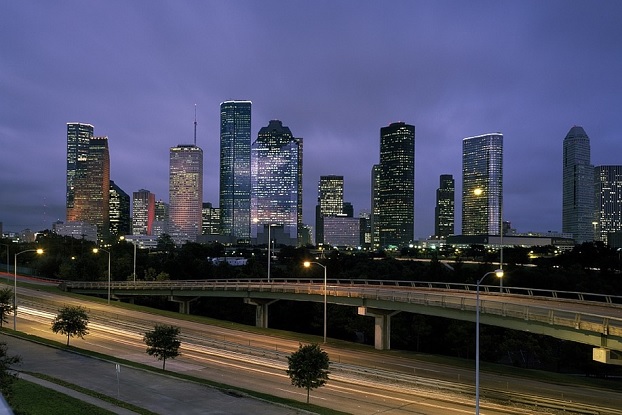
Houston, I sold you short for so many years. I let the haters define you, the skeptics doubt you, the snobs write you off. Growing up in Sugar Land, shitting on Houston, proper, was quite fashionable. To slam its unwalkable, sketchy downtown; to hate on the traffic, the alleged sleaze of the Richmond strip, to speak in hushed tones about the Fifth Ward.
A friend who grew up in town once joked to me that kids from Sugar Land only ever drove to places just off highway 59, now Interstate 69. She wasn’t wrong; it was field trips to Houston Museum of Natural Science, Oilers games at the Astrodome and Rockets games at the Summit, sticky summer days at AstroWorld. Houston, a la carte.
Growing up around Houston, its unregulated expanse and culture of dependence on the energy industry brought me a great sense of shame. I left in 2002 for college in Austin and then left Texas entirely in 2008. I left with the certainty that there were better ways to live and think. And the further you get from Houston, the easier it is to buy into the idea — that it just doesn’t make sense, and is somehow beyond redemption.
But Houston never seeks your approval. It never goes out of its way to please you or justify itself. It accepts its flaws, its glaring imperfections.
“I love it all: Its concrete endlessness, its energy industry, its obesity, its diabetes, its politics.”
I love it all: Its concrete endlessness, its energy industry, its obesity, its diabetes, its politics. The late, great, Westwood Mall, the KPRC Channel 2 station, the Toys “R” Us next to Southwest Memorial Hospital where I was born. Downtown — once-ghostly downtown. Massive George R. Brown Convention Center, built to look like a steam liner, with massive red steam pipes (they serve no nautical purpose) and a service entry along one side that looked like the deck of a ship. After Hurricane Harvey, it became a massive shelter for Harvey survivors.
In the weeks, months, and years to come, people will talk of Houston’s sprawl and unregulated development, and its mighty energy industry. Without that sprawl, you don’t have the Sugar Lands, the Katys, the Kingwoods that immigrants like my parents moved to; without the energy industry, you don’t have their very thing that drew them to the area. This is a tension that’s hard to accept — the seemingly unsustainable nature of this megalopolis is what allowed it to become a home for us. Houston, with its concrete arteries, its pockets of Indians, Chinese, Vietnamese, Filipinos that have defined the city in its modern age.
The Million: Immigrants from around the world are transforming Houston. Our special project: https://t.co/x7r4yE5Qg7 pic.twitter.com/AaPCKnW59J
— Rachael Gleason (@rachaelgleason) January 29, 2017
We, the immigrant outsiders, squeezed ourselves into neighborhoods full of friendly Protestants, subdivisions peppered with baseball diamonds and churches. There were pizza nights on Tuesdays. Mediocre high school football and overrated marching bands on Fridays. Bayous snaking along the edge of golf courses and palatial country clubs, Boy Scout troops and booster clubs, cheerleading camp and ice cream shops, pictures of the soccer teams they’d sponsored hanging on their walls. I know it all sounds decidedly uncool, and weirdly in opposition to the idea of flourishing immigrants able to continue being just who they are.
These days, I’m thinking of places like Hillcroft. As Monica Rhor wrote in the Houston Chronicle a few years ago, it’s a part of town where you can see signs in Arabic, Spanish, Urdu, and stores selling saris next to ones selling quinceañera dresses, or pick up Guatemalan delicacies, pastries from the Middle East, meander through a flea market. I don’t know what these shopping centers, cafes, video stores, clothing emporiums, bakeries, and masjids, meant to non-brown folks.
“The seemingly unsustainable nature of this megalopolis is what allowed it to become a home for us.”
This place, where a good chunk of the city’s massive immigrant population could take up some version of its old life while building a new one, existing within the vastness of Houston and yet apart from it all, encapsulates so much of what makes the city irreplaceable. I don’t think I knew that then.
There are cities that boast of their multi-culturalism, that suggest they’ve discovered the utopian formula: the right mix of assimilatory enthusiasm with liberal open-mindedness, the courage to stick up for one’s neighbors and the fortitude to respond with kindness when greeted with ugliness.
The grief I feel for home is mixed with a deep sense of shame for leaving, and for believing that home had somehow stopped meaning something to me. At present, my worries remain, most chiefly, for family and friends in the Houston area who’re still suffering. But I worry about the foundations of this great city. I wonder how I could’ve taken it all for granted.
* * *
The original version of this essay appeared on September 1, 2017, at https://siddharthamahanta.wordpress.com. Siddhartha Mahanta is a writer and editor in Washington, D.C.












